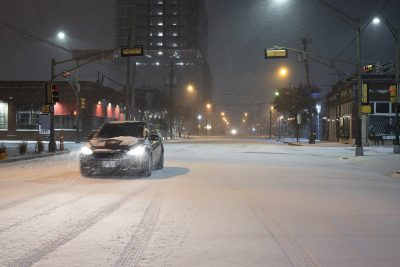
Boston University students learning remotely in Texas faced difficulties with online classes during recent winter snow storms.
Dean of Students Kenneth Elmore sent out an email Thursday to express support for the students in states hit by the storm.
“Our hearts are with the millions of people who are dealing with frigid temperatures, have no heat or electricity, and are facing additional challenges,” Elmore wrote.
He noted students facing any difficulties should reach out to their professors, and any affected students can reach out to the Dean of Students office as well.
“Whether you are on campus and have family back home effected,” Elmore wrote, “or are a LfA student who is in the middle of this right now – we extend our support to you during this difficult time.”
Elmore said in an interview BU is doing its best to accomodate students during this challenging time.
“We’ve also reached out to the schools and colleges,” he said, “just to say if you can work with these students, do so.”
Elmore added he hopes students are aware of the University’s concessions during the difficulties presented by the snow storm.
“These folks are in the midst of real natural disaster right now,” Elmore said, “so I’m hoping our message got through to people.”
Mia Metni, a sophomore in the College of Engineering, said she had a hard time attending classes and meetings when she decided to return to Texas Valentine’s Day weekend.
“I had a lot of issues with wifi and connectivity,” she said. “I couldn’t join a lot of Zoom meetings.”
Metni said the response from her professors varied, with some being helpful while others were less so.
“A couple of my professors were really nice and they emailed me back,” Metni said. “And some just ignored me, so it was a little bit tough. I didn’t have the ability to spend as much time on work as I wanted to.”
Kaylin Rix, a senior in the School of Hospitality Administration, said many people did not realize the severity of the situation in Texas.
“I think a lot of people are failing to realize that this could be affecting people,” she said. “The other day, I couldn’t even focus in one of my classes because I was too busy trying to explain to people what’s happening and I was just not in the right headspace.”
Rix noted during the power outage, many people in her hometown couldn’t go to school in person or online.
“My sisters, they have had school off pretty much all week,” she said. “Because no one can access any resources.”
SHA junior Sonali Malik said she was shocked and worried about her family when she first heard about the storm, but thankfully they have been okay.
“I’ve lived in Texas for 20 years and I’ve never ever seen snow like that stick to the ground,” she said. “So seeing actual snow on the ground and lakes and creeks freezing was pretty insane to me.
Malik said she is also working in a company based in Dallas, but she had the entire week off because many of her colleagues either don’t have power or internet.
“My team that I directly work with, one of them, she just got her power back yesterday,” she said. “And she didn’t have her power for four days. She has two kids … so she’s had a really rough week.”
Malik said the storm disportionality affected lower income communities.
“The Metroplex has a pretty big issue with housing discrimination,” she said. “The lower-income people aren’t receiving as many resources as they should.”
Bonnie Jacobs, a professor in earth sciences at Southern Methodist University, wrote in an email the reason behind the extreme weather in Texas is air from the polar vortex travelling much farther down than usual.
“Meteorologists have said that this is more likely to happen and cause extreme weather, when the jet stream is weak,” she wrote. “That is, without the jet stream, which travels from west to east, keeping polar air in its usual polar region, that air (which is dense as well as cold) dips to the south.”
However, Jacobs wrote the reason this weather affected Texas so severely was due to “poor planning, and population growth.”
“We have greater demand for electricity than ever,” she wrote. “When you couple this with an energy grid that is not prepared with regard to the bigger picture, then it turns into a mess.”
Jacobs added if the Electric Reliability Council of Texas isn’t forced to make changes, the most cost-effective option will probably be chosen.
“They will do what businesses usually do,” Jacobs wrote. “As little as possible to turn the biggest profit.”
Nick Kolev contributed to the reporting for this article.


